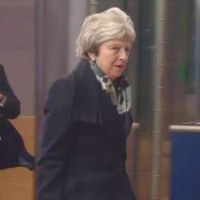(BRUSSELS) – As PM Theresa May sought to save her Brexit deal at a Brussels summit Thursday, EU leaders clarified their position on the ‘backstop’ but stated there would be no renegotiation of the UK withdrawal deal.
Speaking for the EU presidency after the meeting, Austria’s Federal Chancellor Sebastian Kurz said they had had a good meeting with Theresa May, where she had explained the problems she had in Parliament with the so-called ‘backstop’. He confirmed that talks on the withdrawal agreement would not be reopened. But they had of course decided, and made clear that the backstop was a temporary measure and not a long-term solution.
Following discussions, Mrs May left Brussels before the Article 50 meeting between the EU 27, without speaking to the press.
At the meeting, the leaders formally endorsed the Withdrawal Agreement. In statement, they said they stood by the agreement, and declared their intention to proceed with its ratification. They reiterated that it was not open for renegotiation.
The leaders nevertheless said they wished to establish as close as possible a partnership with the United Kingdom in the future, and were ready to begin talks on a future arrangement as soon as the Withdrawal Agreement was signed.
As to the so-called ‘backstop’ – the measure to prevent a return to a hard border in Northern Ireland, the summit stressed the fact that it is intended as an “insurance policy to prevent a hard border on the island of Ireland and ensure the integrity of the Single Market”. It affirmed the EU’s determination to work speedily on a subsequent agreement to establish alternative arrangements “by 31 December 2020”, so that the backstop would not need to be triggered.
If the backstop were to be triggered, the summit conclusions state that it would “apply temporarily, unless and until it is superseded by a subsequent agreement that ensures that a hard border is avoided”.
If this did happen, the Union would “use its best endeavours to negotiate and conclude expeditiously a subsequent agreement that would replace the backstop”. It says it would expect the same of the United Kingdom, “so that the backstop would only be in place for as long as strictly necessary”.
Finally, the European Council called for work on preparedness for the consequences of the United Kingdom’s withdrawal to be intensified, “taking into account all possible outcomes”.
Whether this will be enough to assuage the more extremist members of Mrs May’s conservative party remains to be seen.



